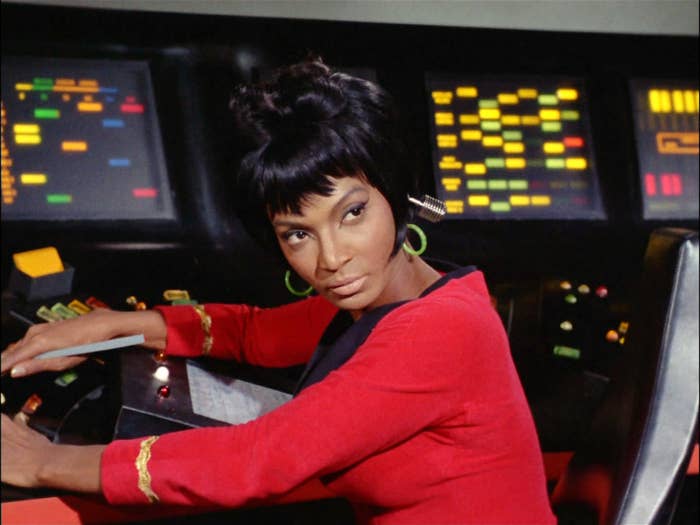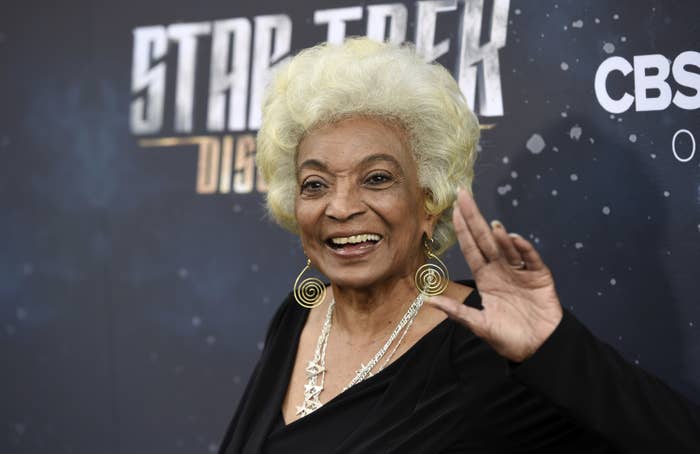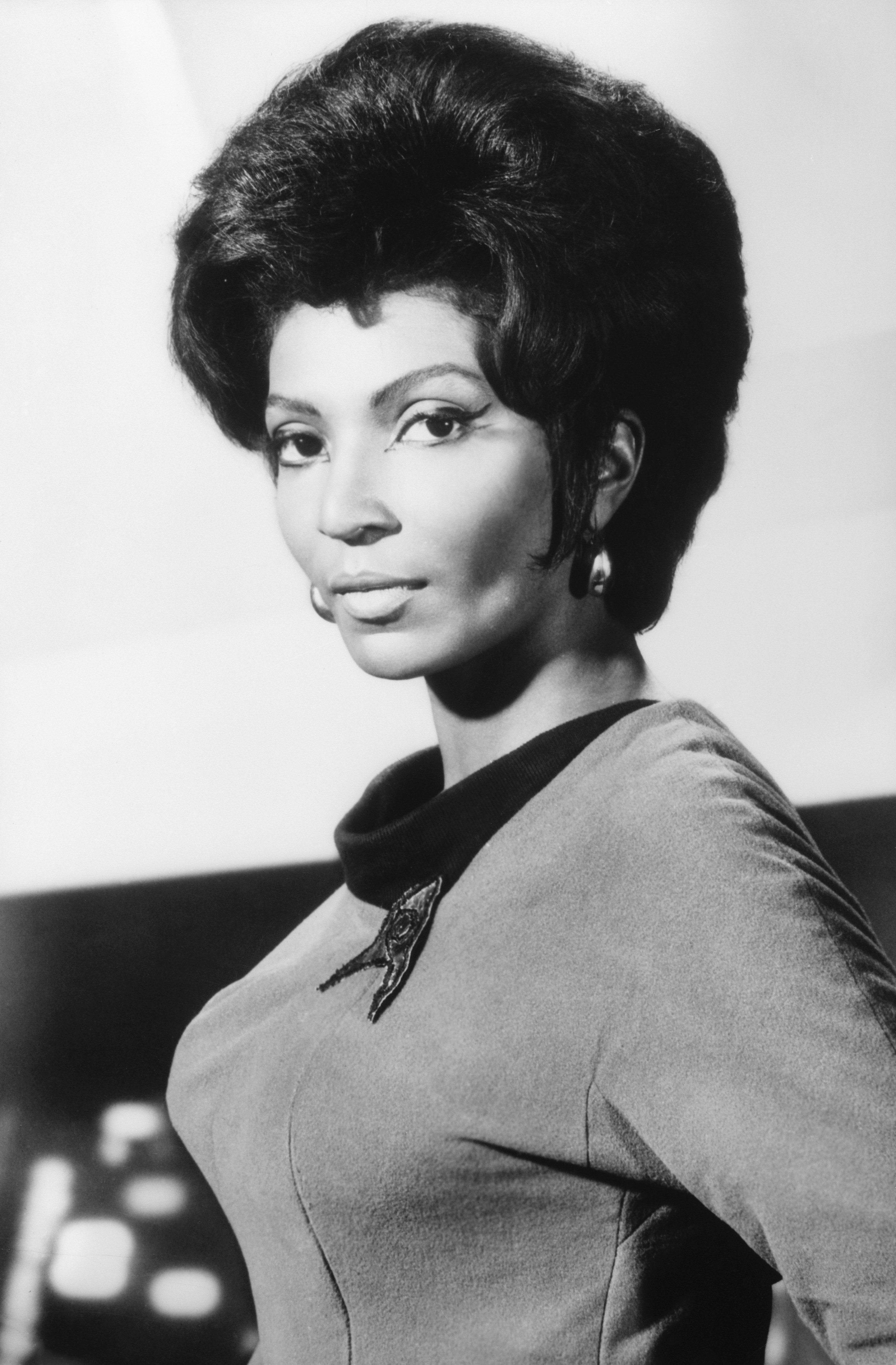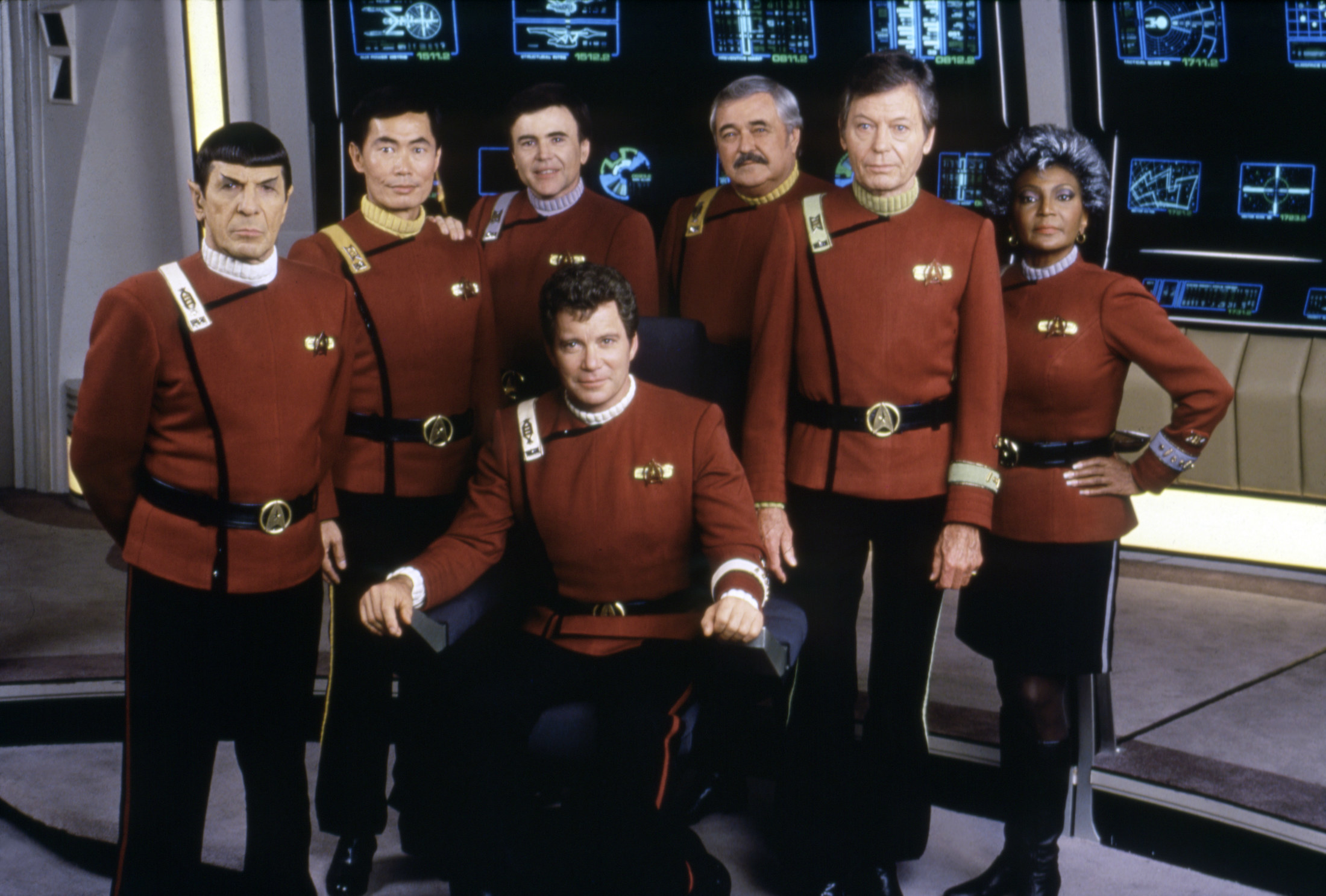
Nichelle Nichols, the actor who became a Star Trek legend and broke ground for Black women onscreen with her portrayal of Lt. Nyota Uhura, has died. She was 89.
She had been treated for dementia in her 80s, and in an Instagram post on Sunday, her son, Kyle Johnson, wrote that she died of natural causes.
"Her light however, like the ancient galaxies now being seen for the first time, will remain for us and future generations to enjoy, learn from, and draw inspiration," Johnson wrote. "Hers was a life well lived and as such a model for us all."
A beloved icon of the science-fiction franchise, Nichols’s casting as a prominent character in a position of authority was unprecedented and radical for a TV show that first aired in 1966. Her character’s kiss with William Shatner’s Captain James Kirk also broke ground for being one of the first interracial kisses ever aired on television. After the original series ended, Nichols worked with NASA to recruit women and people of color as astronauts and continued to act, appearing onstage and in films like Snow Dogs and the TV series The Young and the Restless. Still, throughout her life, she remained devoted to Star Trek and was a fixture at fan conventions well into her 80s.
“Every time I sat down at my console on the bridge of the Enterprise, I felt that I was in the twenty-third century, that I was Uhura. The promise of that imaginary universe was real to me,” Nichols wrote in her 1994 autobiography, Beyond Uhura: Star Trek and Other Memories. “I am still very proud of Uhura: proud of who she was (or will be) and what she represented, not only in her time but in ours, and in those of people who will discover Star Trek decades from now.”

Born Grace Nichols in 1932 in the Chicago suburb of Robbins, Illinois, Nichols knew at a young age that she wanted to be onstage. “Even before I could walk, I could sing,” she wrote in Beyond Uhura. She started taking ballet classes at age 7. As a teenager, she danced at the College Inn, a famous venue in downtown Chicago, where she caught the eye of Duke Ellington. She later toured with the jazz legend.
Her first break in Hollywood came through a small part as a dancer in the 1959 musical Porgy and Bess starring Sidney Poitier. Five years later, she made her television debut playing the fiancé of a Black Marine in an episode of The Lieutenant, the first show produced by Gene Roddenberry, who went on to create Star Trek.
According to her autobiography, when Nichols first auditioned for Star Trek, her character had not yet been created, so she read for the part of Spock. It was only after she signed on to the show that Nichols and Roddenberry conceived Uhura. Her name was derived from Uhuru, the Swahili word for freedom and the title of the book Nichols was reading when she auditioned.

“I said well why don’t you do an alliteration of it and soften the end with an ‘a’ and it will be Uhura,” Nichols recalled in an interview years later. “[Roddenberry] said, ‘That’s it. That’s your name.’”
Initially frustrated with her lines getting cut and the racism she faced on the studio lot, she famously almost quit the series after one season to pursue theater jobs. But she decided to stick with it after a chance encounter with Martin Luther King Jr., who convinced Nichols of the significance of her role to the Black community.
“He said, ‘For the first time on television we will be seen as we should be seen every day, as intelligent, quality, beautiful people,’” she recalled. “And he said, ‘… Gene Roddenberry has opened a door for the world to see us. If you leave, that door can be closed.’
“And at that moment the world tilted for me,” Nichols said.
Still, she had to continue fighting for lines and for her character’s integrity. In her autobiography, she recalled one new director who insisted that Uhura “do something cutesy” that she “simply would not do.” She held her ground and — after Roddenberry backed her up — the director relented.
“This was not a ‘female role,’” she recalled, using her hands to make air quotes, in Woman in Motion, a 2021 documentary about her life and work with NASA. “And I refused to treat it that way.”
Eugene "Rod" Roddenberry, the son of Gene Roddenberry and an executive producer of several franchise series, reacted to her death on Sunday.
It is with great sorrow that we report the passing on the legendary icon Nichelle Nichols. No words. #roddenberry #RIPNichelle #StarTrek
Though the original series only aired for three seasons, Lt. Uhura’s impact was far-reaching. Nichols’ portrayal inspired other actors, like Whoopi Goldberg, who was in Star Trek: The Next Generation, and real-life space explorers, like Mae Jemison, the first Black woman to travel into space. “It wasn’t until Lt. Uhura did I realize that I was in the future,” Goldberg said later. In the late 1970s, as NASA struggled to attract women and people of color to apply to its Space Shuttle program, the agency hired Nichols to lead a campaign to recruit the first women and people of color to travel to space. She was awarded the agency’s public service award in 1984.
Nichols and her costars eventually returned to the Enterprise to reprise their roles in six Star Trek films. She also returned to one of her first loves: the musical stage. In a 1990 one-woman show called Reflections, Nichols paid tribute to more than a dozen iconic performers, including Josephine Baker and Ma Rainey. “Although people know me best as Uhura, I’ve always considered acting the ‘other’ thing I do,” she wrote in Beyond Uhura. “While months, sometimes years, passed without my setting foot before a camera, music filled every day of my life.”
She often spoke of not ever wanting to retire. But after a stroke and a dementia diagnosis, she stepped away from public life in 2021. In 2018, due to fears that she was susceptible to exploitation, her son petitioned the Los Angeles County Superior Court to place her in a conservatorship and later moved her to New Mexico, where he lives. The legal arrangement drew scrutiny from some of Nichols’s friends and the Britney Spears fans who rallied in the #FreeBritney movement against potential conservatorship abuse.

Nichols had been one of four of the original Star Trek cast who were still alive. Shatner, George Takei, and Walter Koenig are now the only surviving members of the group.
In tweets, Takei described Nichols as trailblazing and incomparable, adding that he'd have more to say about her legacy.
"For today, my heart is heavy, my eyes shining like the stars you now rest among, my dearest friend," he wrote. "We lived long and prospered together."
The diversity of that cast made them stand out on ’60s TV, and it continued to be a hallmark of Star Trek through spinoff series and films following the crews of other starships. On one current series, Star Trek: Discovery, a Black woman named Michael Burnham, played by Sonequa Martin-Green, is not just a member of the bridge crew like Nichols, but the captain.
“Everyone has her own idea about why Star Trek has endured,” Nichols wrote in her autobiography. “I firmly believe in the power of vision, and Gene Roddenberry’s Star Trek raised the prospect that space offered humankind the opportunity to start anew. … He believed, as do I and many others, that this was not simply one possible version of the future, but the only viable one.”
